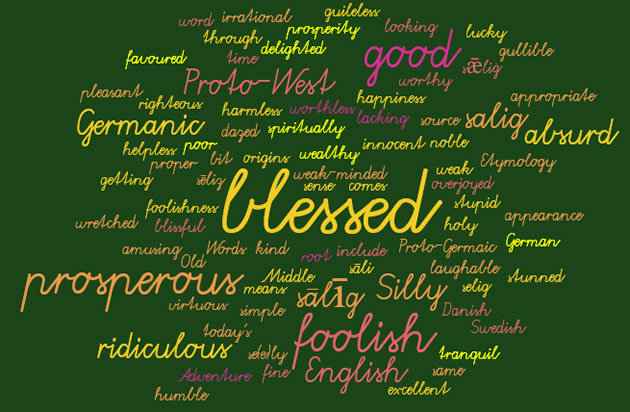Podcast: Play in new window | Download
In today’s Adventure in Etymology we’re getting a bit absurd and ridiculous and looking at the origins of the word silly.

Generated with WordItOUt
Silly [ˈsɪli] means:
- laughable or amusing through foolishness or a foolish appearance
- weak-minded or lacking good sense; stupid or foolish
- absurd; ridiculous; irrational
- stunned; dazed
It comes from the Middle English se(e)ly [seːliː] (spiritually favoured, blessed, holy, virtuous, righteous; worthy, noble, fine, excellent; fortunate, lucky, prosperous; happy pleasant; wealthy; innocent, harmless, good; simple, guileless, foolish, gullible; weak, helpless; wretched; humble; worthless) [source].
From the Old English sǣliġ [ˈsæː.lij] (blessed, fortunate, prosperous, happy), from the Proto-West Germanic *sālīg (blissful, prosperous, happy) from *sāli (happiness, prosperity; proper, appropriate time), from the Proto-Germaic *sēliz (happy, fortunate; kind, good) [source]
Words from the same Proto-West Germanic root (*sālīg) include: salig [ˈsæːli] (blessed) in Danish, salig [ˈsɑːli(ɡ)] (blessed, delighted, poor) in Swedish, and selig [ˈzeːlɪç] (overjoyed, tranquil, blessed) in German [source].
Here’s a video I made of this information:
Video made with Doodly – an easy-to-use animated video creator [affiliate link].
Here’s a silly little ditty I wrote in 2019 about being silly and odd: It’s Okay To Be Odd / Mae’n Iawn Bod yn Od
I also write about words, etymology, and other language-related topics, on the Omniglot Blog, and I explore etymological connections between Celtic languages on the Celtiadur.
You can also listen to this podcast on: Apple Podcasts, Amazon Music, Stitcher, TuneIn, Podchaser, PlayerFM or podtail.
If you would like to support this podcast, you can make a donation via PayPal or Patreon, or contribute to Omniglot in other ways.
